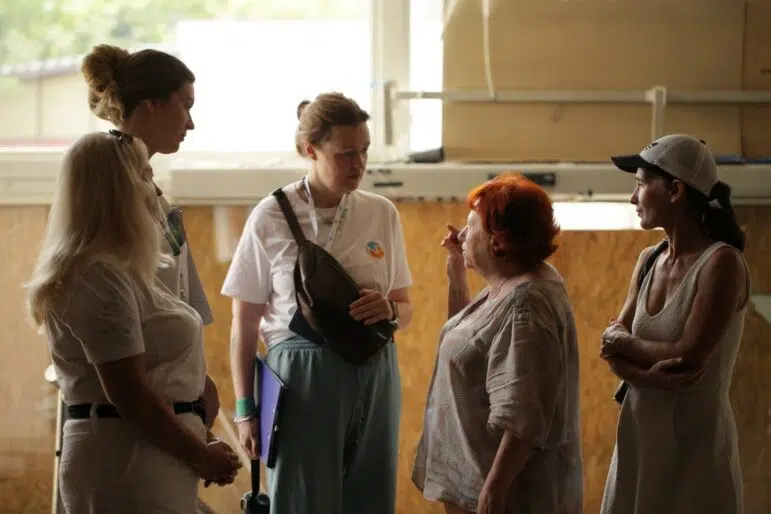Risk, Protection & Locally-Led Humanitarian Response
Kristina Preikšaitytė

Humanitarian space is shrinking, access is declining, and the number of conflicts around the world is increasing. Civilians are at the frontlines of war, carrying the risks and heavy weight of humanitarian responses to crises.
Unwilling or unable to sustain presence in many of the most conflict-affected areas, INGOs often rush to partner with Civil Society Organizations (CSOs) to continue their humanitarian activities. In so doing, INGOs themselves become ‘beneficiaries’ – benefiting from ‘local’ volunteers who undertake last-mile deliveries along the frontlines and, therefore, carry a heavy burden of safety and security risks – such as in Ukraine. INGOs benefit from images shared by their partners, which are put into reports to illustrate distribution of humanitarian aid – such as in Sudan. They benefit from knowledge shared by their partners on the ground, while reducing their own risks by relocating operational hubs to neighbouring countries and providing remote support – such as in Myanmar.
In exchange, CSOs are given sub-grants to continue of their life-saving work. This can come at a cost – often in the form of 20-page long due diligence checklists, complex reporting schedules (and equally complex reporting templates, different per each INGO), plus some ‘capacity-building’ to learn of the ins and outs of the humanitarian economy. It is rarely possible to use any of the allocated funding to build out organizational structures needed to comply with reporting and due diligence requirements, which means exhausted volunteers scramble to find time to do their work and meet grant requirements.
Accountability – knowing that public funds are shared and used responsibly – is essential to maintaining trust from those who support crisis responses. At the same time, our vision of accountability needs to be holistic and multi-directional. INGOs are advocating for themselves to their donors to ease and reduce humanitarian bureaucracy and are making some progress. Most often, this flexibility is not extended to ‘downstream partners’ like CSOs. Institutional donors (often aid ministries from Western states) rarely fund CSOs directly and encourage INGOs to continue and improve their roles as intermediaries. This ‘improvement’ often looks a particular way – the development of standards, success indicators, good and better practices, and more reporting templates.
It doesn’t have to look that way. There is a different way of working alongside local CSOs so that together, we can better achieve our common goals. New systems have been built to support more equitable and responsible partnerships between INGOs and CSOs – see Peace Direct’s Transforming Partnerships in International Cooperation, for example. Building on this work and through lessons learned on the ground in places like Ukraine, Nonviolent Peaceforce has recently launched a Partnerships Management Toolkit. Our goal is to reduce the administrative burden for CSOs and ground partnerships in mutual trust, so that together we can provide protection and humanitarian responses that are safer and meet the needs of communities impacted by violence.
The Toolkit calls for moving away from risk outsourcing (transferring risk – say, of working in highly insecure environments – onto partners) to risk sharing (identifying and managing risks together); guaranteeing financial, technical, and protective resources to CSOs, including access to MHPSS, Personal Protective Equipment (PPE), first aid kits, health insurance – a duty-of-care-package – the bare minimum an INGO can offer to support their partners. The Toolkit offers practical guidance at each step of a project cycle to strengthen equitable, collaborative, and responsible partnerships.
Importantly, the Toolkit – as well as the accompanying strategy document – discusses the very purpose, definition, and added value of a INGO-CSO partnership. We want to see more mutual learning, improvement, and genuine collaboration, and are trialling a range of practical strategies to make that happen. INGOs, like NP, can be so much more than sources of short-term funding for CSOs, and CSOs can be a lot more than ‘implementing’ partners. Together we can work as thought partners and allies, committed to disrupting exclusive systems and facilitating space where those most impacted are recognised and lead in their own protection and action. This disruption of the humanitarian system is likely to be uncomfortable – but it’s a paradigm shift that we all need to be working toward.
NP sits in this discomfort. I certainly do. It is a place of learning and self-reflection. First steps towards more responsible partnerships involve trial and error. INGOs need to be brave enough to make those errors – brave as their partners on the frontlines.
